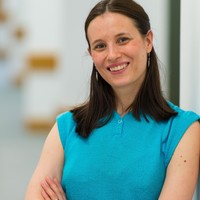Barbara McGillivray

I'm a research fellow at The Alan Turing Institute and at the University of Cambridge. I conceived the MOOC on Dictionaries and contributed to its content. My research is on computational lexicography
Location London
Activity
-
@LearnerAnonymous very good question!Detecting machine-generated content is actually an active research area in computational linguistics community, for example see this paper: https://www.aclweb.org/anthology/2020.acl-main.164.pdf
-
Very interesting discussion! My research is precisely on getting computers to help researchers and lexicographers to identify new meanings. I completely agree that a corpus is needed, though a very long time span isn't necessary. My paper on Twitter (https://www.aclweb.org/anthology/D19-1007.pdf) is a little technical, but it shows that, by using a corpus...
-
Barbara McGillivray replied to Jill Hind
Hi Jill, this is indeed an interesting question. I'm not aware of any hard rule regarding the minimum text length required, but formulations of Zipf's law usually mention a "large corpus". Examples of large corpora are the corpora covered in this course, like the British National Corpus or the Oxford English Corpus.
-
Thank you for your comment! I agree with you that search engines collect data from dictionaries, but doesn't this imply that we still need to produce dictionaries in the first place?
-
Very nice discussion about the difference between dictionaries and search engines. In week 3 we will explore the topic of corpora, which are collections of texts (sometimes taken from the web) and how they are used in dictionary-making for example to offer a wide range of contexts of use of words.
-
Great point, Samantha! Not many people realise that the entries we see on search engines come from dictionary content!
-
Barbara McGillivray replied to Ann Berne
Thanks for pointing this out, we'll try and improve this next time.
-
Barbara McGillivray replied to Simon Goddard
Thanks for your comments. Yes, Sketch Engine is meant for professional lexicographers and corpus linguists, but we wanted to give you all a chance to have a peak too.
-
@IsraelCohen Thanks for pointing this typo out! We'll make sure it's corrected.
-
Barbara McGillivray replied to Vera Nesterova
Thank you for sharing, Vera!
-
Thanks for sharing, a very funny video!
-
@PeteB Thanks for your suggestion, we'll add an overview in English in the next edition of the course.
-
I second Michael's reply. When I worked for the Oxford dictionaries I saw that there were non-native speakers of English working in the etymology team, because they had to know several other languages very well to be able to reconstruct the etymology of English words historically. For current English monolingual dictionaries I only saw native speakers working...
-
Thanks for spotting the typo, Graham!
-
Thanks for sharing your thoughts, James! We will talk more about the future of dictionaries in the final week of the course, so stay tuned!
-
The way Sketch Engine selects good examples will be explained later on in this course, so stay tuned!
-
Barbara McGillivray replied to Sandra S
Good point, thanks! I will make the text more precise in the next version.
-
Barbara McGillivray replied to Christine Bell
I'm glad access to Sketch Engine worked!
-
Barbara McGillivray replied to Pete B
Thank you, Pete! This course is also created by The Alan Turing Institute and Macmillan Education.
-
Thanks for sharing, Christine!
-
Hi Paola. Yes, here we were thinking about the other way around, where you don't have a dictionary to start from because you are the lexicographer. It's indeed a difficult task and there isn't a right or wrong answer, the main point is to think about the process a lexicographer would go through when creating an entry starting from a corpus.
-
Thank you for your suggestions!
-
Hi @AmandaOliver , I don't have the permissions to edit the content of this course at this stage, unfortunately, but I'll discuss it with the rest of the team. Thanks
-
Barbara McGillivray replied to g j
Hi! Have you tried registering for the free trial here: https://auth.sketchengine.eu/#register/form?form=trial ?
-
Hi! Have you tried using the trial here: https://auth.sketchengine.eu/#register/form?form=trial ?
-
Barbara McGillivray replied to Peter J E Williams
Thanks for letting us know. Have you tried this link: https://auth.sketchengine.eu/#register/form?form=trial ?
-
Thanks for raising this point, Amanda. We will include other links in the next edition of the course.
-
Thanks!
-
Thanks for raising this point about corpus as deus ex machina. It nicely summaries the fascination many have for so-called Big Data. It's definitely part of the lexicographer's work to critically check the results from the corpus and using their experience and knowledge.
-
Barbara McGillivray replied to Pete B
Thank you for spotting this. We did flag this up but it must have slipped through the net.
-
Thanks for sharing!
-
Barbara McGillivray replied to Ven Sirinda
Hi Ven, it is true that many lexicographers are native speakers, but in my experience this is not always a completely strict requirement.
-
Barbara McGillivray replied to Gabriel Dias
That's indeed a very good question, and one which we will explore further in the rest of this course.
-
Thanks for spotting this, Mark!
-
Thanks for sharing, Liz. The tools used by lexicographers have become more more user-friendly over time, but it's still true that there is a potential bias towards computer-literate people. Very interesting!
-
Thanks for sharing this information, Rachel!
-
Barbara McGillivray replied to g j
Thank you for sharing!
-
Thanks for sharing your thoughts, Diana! This is one of the reasons we created this course, I'm glad to see it's working.
-
Thanks for spotting this! We'll make sure to include a list in the next edition.
-
Thank you for sharing this!
